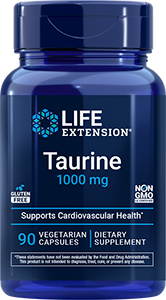
13 Taurine Benefits: More Than Just Energy Drinks
Published: March 2022 | Updated: September 2023
Maybe you’ve heard of taurine but don’t know much beyond its usage in energy drinks. Taurine is a naturally occurring amino acid which promotes heart health, brain health and more. Fortunately, you can buy a stand-alone taurine supplement–which comes in handy if you'd rather not pump yourself full of the caffeine and sugar and other unhealthy ingredients that are in so many of the fizzy taurine drinks you'll find at your local convenience store.
So what exactly is taurine, how does it work, and why is it a common energy drink ingredient? Let's look at taurine's many beneficial effects.
What is taurine?
Taurine is a sulfur-bearing amino acid that's present in relatively large amounts in several of the body's organs, like the heart and brain. In fact, it accounts for roughly 50-60% of the free amino acid pool in your body, which means it has a big job to do. However, taurine is different from most other amino acids because it's never incorporated into proteins. In other words, while most amino acid molecules combine to form proteins (which play their own very important role), taurine is used in a variety of other ways—everything from exercise performance to the synthesis of bile. More on that in a moment!
Taurine is a semi-essential nutrient. This means that you can get it from your diet (assuming you are not a vegan, as taurine isn't found in plant-based foods). The human body does produce some taurine as well.
What are the health benefits of taurine?

Now that you know a little more about taurine, let's get into some taurine health benefits.
1. It supports healthy cellular energy levels
Research suggests that taurine supplementation supports the health of your mitochondria, which power your cells with energy. As we mentioned, that's likely why it's so often found in energy drinks.
2. Taurine protects cells against oxidative stress
Many studies have demonstrated that taurine plays a role as an antioxidant in protecting cells and mitochondria against oxidative stress. The healthier your mitochondria are, the more they can help you power through your day by supporting optimal cellular energy.
3. It supports healthy heart function
Taurine supplementation might support cardiovascular health, particularly systolic left ventricular function. This is likely due to how taurine can support cellular health, which of course includes the mitochondria in your heart (among your other organs!).
4. Your brain on taurine
Early findings suggest that taurine may help promote healthy cognitive function, particularly as you age–specifically when it comes to learning and memory. In fact, taurine has been found to be crucial to brain development of infants (who don't make taurine on their own, and must get this nutrient from breastfeeding, formula and baby food).
In many ways, taurine actually acts like a neurotransmitter (molecules that transmit messages between cells). You'll find it in very large quantities in the excitable tissues of the central nervous system. Taurine's role is believed to be neuroprotective, so that your nerves and brain cells stay healthy even in the face of environmental and other stressors.
5. Taurine supports a healthy vascular system
Human studies have found that taurine supports already-healthy blood pressure levels and overall vascular function.
6. A sweet reason to supplement with taurine
Taurine won't stop you from eating that donut, but once you do, it could help you metabolize it properly! That's because taurine encourages the healthy metabolism of carbohydrates and sugars. Supplementation might support healthy glucose metabolism and insulin secretion.
7. It supports the healthy metabolism of fats
In an ideal world, we'd all avoid saturated animal fats (just as we should have probably passed on that donut). But if you do eat more than your share of fried eggs and bacon–say, for example, you're a devotee to the keto diet–you might want to add taurine to your supplementation strategy. One study found that taurine supplementation helped participants maintain already-healthy cholesterol levels–even when given a high-cholesterol and high-fat diet.
8. Taurine supports healthy eyes
See here–we've got yet another reason taurine is so important! in studies involving both humans and animals, a taurine-deficient diet impacted the health of the retina. Why? Taurine might help protect the photoreceptor–the cells in the retina that respond to light.
9. Taurine may be a way to be kind to your kidneys
Early studies in animal models showed that taurine can help protect the kidneys.
10. Taurine and aerobic exercise performance
Whether you walk, jog or run, if you're looking to optimize your cardio output, you might want to add taurine to your supplement regimen. Findings suggest that taurine supplementation might support your exercise capacity. Specifically, it can benefit your VO2 max and time to exhaustion.
11. Calling all gym rats: taurine supplementation could support intensive exercise
Not much of a cardio bunny? Taurine was found to benefit strength and power training performance, too. It may also promote healthy muscle mass. (This also explains why taurine is a popular choice among aging individuals, who take taurine to fend off age-related muscle changes.) So however you get your sweat on, taurine (along with a diet that contains plenty of protein) is the perfect exercise buddy.
12. Promote exercise recovery faster with taurine
Let's face it: it's not fun to waddle around stiffly after leg day! Taurine is a good supplement for those of us who tend to push ourselves to the max, because it supports muscle recovery. This means that your exercise recovery periods could be easier and shorter.
13. Taurine may support healthy gene expression
In your body, you've got taurine-sensitive genes that play a role in certain cellular functions. This means that taurine supplementation might help to regulate how your genes express themselves.
Explore Our Best Active Lifestyle & Fitness Supplements
How does taurine work?
Taurine acts in multiple ways:
- It's an antioxidant
- It supports energy metabolism
- It helps support healthy gene expression
- It protects your cells against different types of stress
Why is taurine in energy drinks?

Every cell in your body has tiny energy powerhouses called mitochondria. Taurine helps to keep the mitochondria working optimally. It might also support your athletic performance and exercise capacity.
As an important disclaimer, do bear in mind that energy drinks are mostly water, sugar, and caffeine—and other ingredients that don't offer health benefits. While they might contain taurine, you shouldn't rely on these beverages as a source of nutrition.
Taurine: tips and facts
Now that you know some of the benefits of taurine, let's go over a few interesting tips and facts.
Are L-taurine and taurine the same thing?
They are! The L stands for "levo," which is a chemical term. All taurine is L-taurine, and the terms are interchangeable.
Nutrition Corner: What foods contain taurine?
If you eat a good amount of animal-based protein, you might be getting enough taurine from food sources. You'll find taurine in lots of animal products:
- Fish (tuna, tilapia, octopus, scallops)
- Chicken
- Turkey
- Beef
Are there any vegetarian sources of taurine? Not really.
Red seaweed contains taurine, but there's not much taurine in the brown and green seaweed used for sushi. (However, seaweed is a nutrition powerhouse because it's a great source of iodine, fiber and omega-3 fatty acids…so by all means, add it your diet!)
Should I take taurine supplements?

In a perfect world, of course, we get all of the vitamins, nutrients, and minerals we need from our diet–no supplements (particularly those that come in sugary drinks) required. However, for most of us, this simply isn't feasible. Getting adequate amounts of taurine can make a noticeable difference in your sense of wellness, particularly if you follow a mostly plant-based diet.
While you might already be getting taurine from animal products (which are the only foods that contain appreciable amounts of taurine), clinical studies of taurine supplementation show an array of benefits. Especially if you are vegan or vegetarian, you're likely not getting taurine from your plant-based diet and could be at risk for a taurine deficiency. Taurine is not found in plant foods (although they have many other nutrition benefits!).
Keep in mind, too, that your heart and brain might be producing their own taurine, but it's happening in very limited quantities. Your body needs around 3000 mg daily to function properly, so supplementation might be necessary.
Should taurine be taken on an empty stomach?
Yes. Amino acids are best absorbed without food in the stomach.
Are taurine supplements safe?
Yes! Studies show that two to four grams divided into two or three daily doses is safe without side effects. Higher doses (like six grams daily) have shown to be safe for up to four weeks.
Can I take NAC and taurine together?
N-Acetyl-L-Cysteine (NAC) is another popular antioxidant that supports your body from head to toe–perhaps most famously your immune function and liver health. Yes, you can take NAC and taurine together, in appropriate doses. Both are safe amino acid supplements that are great options.
References
- Almeida, Cristine Couto et al. "Bioactive Compounds in Infant Formula and Their Effects on Infant Nutrition and Health: A Systematic Literature Review." Int J Food Sci., 2021, https://www.ncbi.nlm.nih.gov/labs/pmc/articles/PMC8140835/
- Ames, Bruce N. "Prolonging healthy aging: Longevity vitamins and proteins." Proc Natl Acad Sci U S A, October 2018, https://pubmed.ncbi.nlm.nih.gov/30322941/
- Bkaily, Ghassan et al. "Taurine and cardiac disease: state of the art and perspectives." Canadian Journal of Physiology and Pharmacology, February 2020, https://cdnsciencepub.com/doi/10.1139/cjpp-2019-0313
- Castelli, Vanessa et al. "Taurine and oxidative stress in retinal health and disease." CNS Neurosci Ther., April 2021, https://www.ncbi.nlm.nih.gov/labs/pmc/articles/PMC7941169/
- Chesney, Russell W et al. "Taurine and the renal system." J Biomed Sci., 2010, https://www.ncbi.nlm.nih.gov/labs/pmc/articles/PMC2994373/
- Lombardini, John B. "Taurine: retinal function." Brain Research Reviews, May 1991, https://www.sciencedirect.com/science/article/abs/pii/016501739190003Q
- Jong, Chain Ju et al. "The Role of Taurine in Mitochondria Health: More Than Just an Antioxidant." Molecules, August 2021, https://www.ncbi.nlm.nih.gov/labs/pmc/articles/PMC8400259/
- Kurtz, Jennifer A. et al. "Taurine in sports and exercise." J int Soc Sports Nutr., 2021, https://www.ncbi.nlm.nih.gov/labs/pmc/articles/PMC8152067/
- Oja, Simo S. et al. "Significance of Taurine in the Brain." Taurine 10, 2017, https://link.springer.com/chapter/10.1007/978-94-024-1079-2_8
- Oja, Simo S. et al. "Taurine as osmoregulator and neuromodulator in the brain." Metabolic Brain Disease, June 1996, https://link.springer.com/article/10.1007/BF02069502
- Ripps, Harris et al. "Review Taurine: A "very essential" amino acid." Mol Vis., 2012, https://www.ncbi.nlm.nih.gov/labs/pmc/articles/PMC3501277/
- Schaffer, Stephen et al. "Effects and Mechanisms of Taurine as a Therapeutic Agent." Biomol Ther (Seoul), May 2018, https://www.ncbi.nlm.nih.gov/labs/pmc/articles/PMC5933890/
- Scicchitano, Bianca Maria et al. "The Beneficial Effects of Taurine to Counteract Sarcopenia." Curr Protein Pept Sci, July 2018, https://www.ncbi.nlm.nih.gov/labs/pmc/articles/PMC6040170/
- Surai, Peter F. et al. "Taurine as a Natural Antioxidant: From Direct Antioxidant Effects to Protective Action in Various Toxicological Models." Antioxidants (Basel), December 2021, https://www.ncbi.nlm.nih.gov/labs/pmc/articles/PMC8698923/
- Tochitani, Shiro. "Functions of Maternally-Derived Taurine in Fetal and Neonatal Brain Development." Adv Exp Med Bio., 2017, https://pubmed.ncbi.nlm.nih.gov/28849440/
- Valero, Myriam Idal. "Taurine supplement makes animals live longer — what it means for people is unclear." Nature. June 2023. https://www.nature.com/articles/d41586-023-01910-4
- Wen, Chaoyue et al. "Taurine is Involved in Energy Metabolism in Muscles, Adipose Tissue, and the Liver." Molecular Nutrition Food Research, September 2018, https://onlinelibrary.wiley.com/doi/abs/10.1002/mnfr.201800536
- "Foods, Herbs & Supplements." TRC Natural Medicines, https://naturalmedicines.therapeuticresearch.com/databases/food,-herbs-supplements/professional.aspx?productid=1024
- "Taurine." https://pubchem.ncbi.nlm.nih.gov/compound/Taurine#section=Depositor-Supplied-Synonyms
- "Taurine Amounts in Foods." https://www.ncbi.nlm.nih.gov/labs/pmc/articles/PMC2813349/table/T2/?report=objectonly
- "Taurine and Carnitine." Vegan Health, https://veganhealth.org/taurine-and-carnitine/
Always be in the know!
Access the latest deals, wellness news, expert health tips & more!






